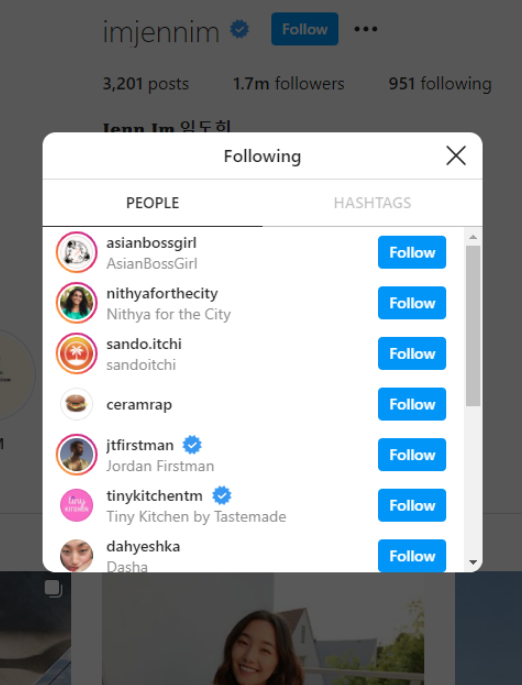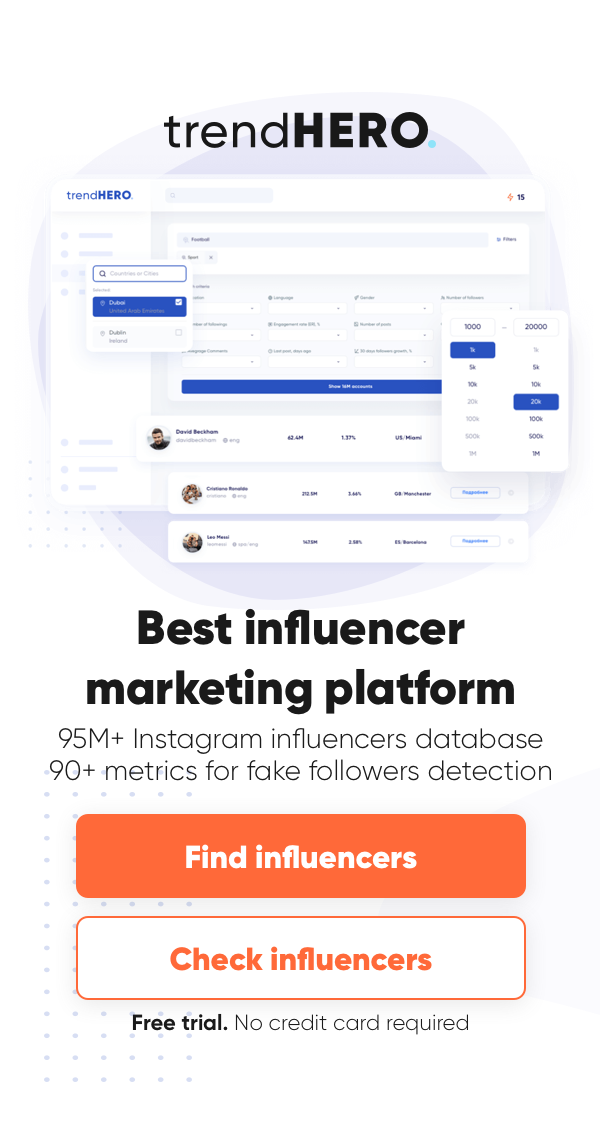Influencer marketing has long stopped being a supplementary strategy for brands. Right now it’s a powerful industry in and on itself estimated at $5 to $10 billion, according to a MediaKix study. But there’s a dark side to it. Inauthentic engagement can result in losses as high as $100 million per year for marketers who don’t keep an eye out for Instagram fake followers. Fortunately, there is a tool to eliminate that risk. A tool that has been used for over a hundred marketing campaigns on Instagram.
What are fake Instagram followers?
Fake Instagram followers are basically accounts that are not owned by real-life people. These profiles are created specifically and solely to inauthentically increase the number of followers for so-called influencers. They don’t show any legitimate activity on the platform. More often than not, they have little to no information in their profiles, no userpics, and sport usernames that consist of random numbers and symbols. Sometimes these profiles just imitate real-life people.
According to various sources, up to 80% of Instagram bloggers and influencers use fake followers.

Why are they doing it? Vanity is one of the reasons. One does sometimes feel that boost to their self-esteem when they know there are hundreds of thousands of people following their profiles. Even if they are well aware these people aren’t real. Some celebrities and influencers don’t even know about the fake accounts following them because there are people who are managing social media profiles for them. All these fake followers create an imitation of rampant activity so much favored by amateurs and slackers. For marketers, this can easily result in a total waste of marketing budgets.
The number of followers, likes, and comments are usually one of the main signs of success of an Instagram profile. But here’s the thing: these metrics only matter when they are created by real people. Fake followers don’t offer any other benefit but pretty numbers.
There are a few common ways to get fake followers:
- Buying bots. There are multiple online services that will gladly sell you thousands of bots at quite a modest price. This usually means that what you are buying is an extremely low-quality fake audience.
- Using software for massfollowing and massliking. The quality of followers you get this way is comparatively higher because sometimes you can actually get real followers. But in all likelihood, it’s just another way to get subscribers who are not interested in your content and hardly ever show any signs of activity.
- Giveaways. Instagram giveaways are a common way to boost the number of followers: people get interested in free offers and start following your account in the hope to win something. In this case, most of them will be real people but it’s very likely they all be about as useful as bots. As soon as your giveaway is over, they’ll lose any interest in your profile whatsoever.
Why are fake followers bad?
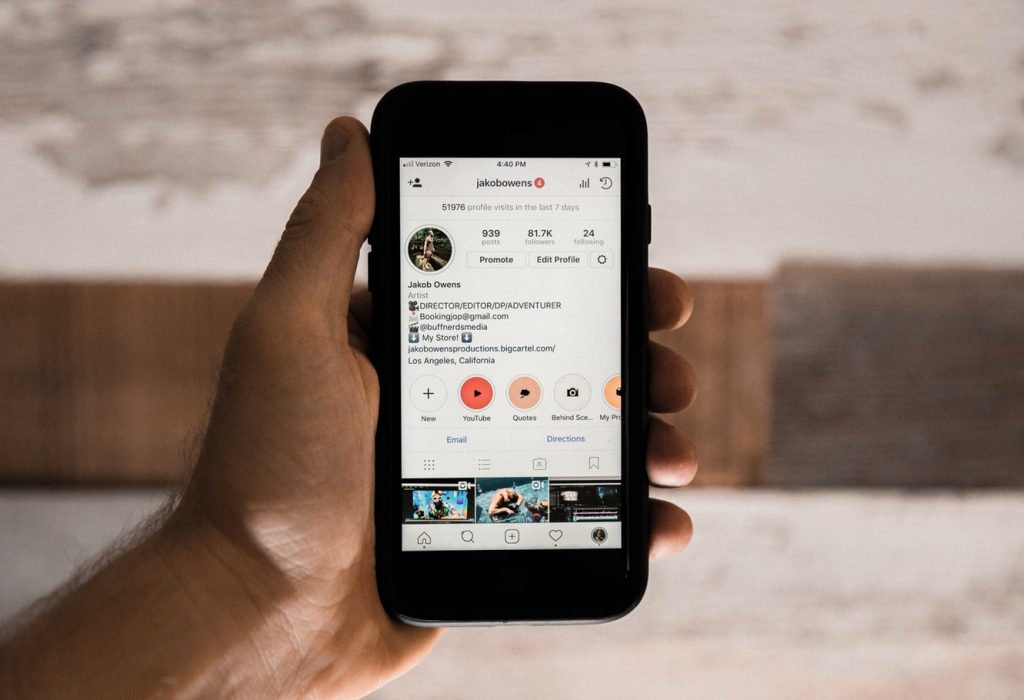
As I said earlier, fake followers are nothing but numbers. They sure look nice but on the flip side, they are completely useless and empty. The majority of fake followers are just bots. They are not interested in your profile, your products, or your brand mission.
Unfortunately, people who like to call themselves influencers often think that buying fake followers is quite a logical step. Especially when there’s no decent content, no strategy, and no consistency. They just don’t have the patience to build their following organically. Along with that, they completely lose touch with real stats that can show what their followers want to see and what they don’t.
They do it hoping to start monetizing their blogs as soon as possible. What they don’t realize is it’s impossible to build a stable income with a strategy like this. Besides, a large number of fake followers creates an illusion that they can rest on their oars and collect the benefits. As a result, they stop working on their profile and their content at all.
Year by year, it gets easier and easier for the marketers to track inauthentic following or activity. Even when the lovers of fake followers are lucky enough to get a sweet deal, it’s a one-time thing. There is no way you can build a consistent income on your fake following.
The platform’s algorithms are evolving too. Instagram has been actively fighting bots and fake followers ever since 2018. As we go forward, the sanctions for this kind of behavior get more and more strict. Instagram removes fake accounts and blocks user actions (like the ability to like posts or leave comments).
Fake profiles and those who started following a blogger for all the wrong reasons don’t care about those brand deals. They won’t show any activity, they won’t go to your website or purchase anything you have to offer. What’s more, the algorithm of the Instagram feed rates posts based on your reach and engagement rate. If a blogger’s following doesn’t view their pictures, comments, or likes their posts, their content won’t be shown even to those few real followers they still have. As a result, no one will see that sponsored content but people who specifically searched for it.
Why people buy followers
There are Instagrammers who don’t really have thousands of followers. And still, their subscribers are interested in their content and want to discuss it, share it, react to it. Other IG users don’t care much about all that. They follow the path of least resistance and choose the inauthentic methods to boost numbers. Which is, let’s face it, nothing but an attempt to dupe potential sponsors.
Quite often those who choose the latter way, give the following reasons for it:
- “No one will ever follow me if I only have 100 followers”;
- “My competitors have so many followers. I’ll buy fake followers so people notice me too”;
- “I want many likes and comments”;
- “If I get 10 000 fake followers, someone will definitely get very interested in my services”;
- “Lots of followers equals lots of brand deals”.
Besides, there’s an opinion that when you are only starting to use the platform, you must get a certain number of fake followers. Allegedly, people don’t like to subscribe to accounts with small numbers of followers but readily follow celebs with multimillion followings.
It might sound funny but some people buy inauthentic subscribers because a large social media audience is trendy.
There might also be another reason for this and it’s completely business-based. A substantial audience is a magnet for marketers. The more followers one has the higher is the cost of sponsored content. Sure, experienced marketers will easily see right through all the fake subs. But less experienced small business owners who heard that Instagram advertising works might get hooked.
Why checking Instagram followers
Let’s say you are the owner of an online store. You decided to get an influencer to advertise your product(s) on their IG profile. They have over 100, 000 followers, hundreds of comments under each of their posts, and a great deal of sponsored content. They seem to have chosen the niche that’s very close to your brand and what you produce. In short, all the signs that it’s a great option for promoting your brand are there.
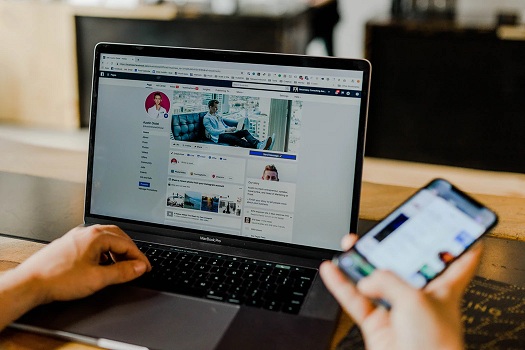
You get inspired and are already picturing a great inflow of new customers, you discuss the terms of your partnership and pay them a certain amount of money. They advertise your product and it seems like the terms and conditions you’ve discussed were met. So what’s next?
Next, you wait for those new customers. And you wait. And then you wait some more. But all you get in reality is a couple of dozen views for your profile. Maybe, if you are really lucky, you’ll get a few PMs with questions about delivery. That’s it. No real customers, no sales.
Why does this happen? There can actually be a few reasons:
- Your product presentation could use some polishing. If it’s not too presentable, it will be extremely hard to convert it into sales. Not everything here depends on an influencer. All they can do is give you access to a wider audience. Your job is to present your product correctly.
- You’ve chosen a wrong niche Instagrammer with an audience that’s mostly not your TA. Before you decide to promote your business with this influencer or another, make sure their audience is your TA.
- The influencer you’ve chosen has lots of fake followers. Most likely, they’ve been bought from some sock puppet farm in the lump.
The latter option is the most common one. Practically all types of IG users resort to this unfortunate method, from micro-influencers to celebrities. In fact, the Institute of Contemporary Music Performance (ICMP) in London studied around 100 celeb accounts on Instagram in 2019. The result of the study is shocking. For example, a famous TV host Ellen DeGeneres has 58% of fake accounts following her IG profile. Ariana Grande’s profile has 46% of fake followers and so does Taylor Swift’s.
If you think that it’s an issue for marketers only, think again. Imagine that you got interested in an Instagram profile of some online store. It’s got a few thousand followers and lots of very favorable comments. You decide to order their product, you pay for it… and get nothing. When you try to complain about it, they just block you. The problem here is you believed the numbers and nice comments from bots that made you think that the brand is completely legit.
An inauthentic audience and inauthentic activity are nothing but a fraud. Influencers try to cheat themselves, their competitors, and their potential sponsors. Brands and online stores try to cheat their potential customers.
The good news is you avoid all the unpleasant consequences of dealing with fake audiences. All you have to do is to take a closer look at profiles and properly assess their metrics.
Signs of a fake follower
In many cases, you don’t really need to do a deep analysis of an IG profile in order to make sure that yes, it uses a crowd of inauthentic subscribers. There are a few things that can be very obvious red flags.
1. Follower to like ratio
Usually, likes in a regular Instagram profile that’s been around for a while should make up 4 to 8 percent of the total number of followers. So if someone has 100, 000 followers, the optimal number of likes per post would be around 4 to 8 thousand.
If this number is lower, there are probably fake followers on this profile. If the number is higher, you are dealing with fake likes. However, even the optimal ratio doesn’t necessarily mean that an influencer’s audience is 100% legit and authentic. It might just mean that they know about the right ratios.
2. Suspicious profiles
The easiest wat to spot those fake followers is to go to your chosen influencer’s profile, click on the “Following” link and look at what kind of profiles are listed there. Keep in mind that it’s better to scroll down because the first profiles you see are the ones you are following or recommended to you by the algorithm.
What do you not want to see here? Profiles with no descriptions and/or profile pictures are an instant red flag. So are the profiles with a massive number of subscriptions or profiles in foreign languages you don’t speak or use in your account.
3. Comments
If you look at the comment section and all you see are single-word comments like “Cool”, “Cute”, “Nice”, “Wow!”, etc or comments that only include emojis, it’s likely they are fake. Also, pay special attention to identical comments from the same people. Check their profiles if you want to. If those are the comments they leave everywhere, they are either bots or paid to comment.
How to Check Fake Instagram Followers
Fortunately, there is no lack of methods to check any inauthentic activity on an Instagram profile. These methods include both automated and paid instruments and manual checks that are absolutely free of charge. Of course, it’s always up to you which methods to choose but it will never hurt to use everything you can. As they say, it’s better safe than sorry.
Automated: Use Instagram follower checker by trendHERO
As a service designed specifically to analyze any Instagram profiles no matter the type, trendHERO offers multiple tools to analyze the audience and its quality.
One of the most useful metrics here is the Audience Type and Audience Type (Likers). The service generates an easy to read pie chart with the percentage for each type of followers on a profile.
As you understand, the “Real” category is the one you should look out for. As the name suggests, they are real people who really read your posts and react to them. Influencers are subscribers with over 5000 followers and a comparatively small number of followed profiles.
A large percentage of mass followers and accounts marked as suspicious says that you are dealing with the inauthentic activity. You’ll probably be better off if you avoid dealing with those influencers.
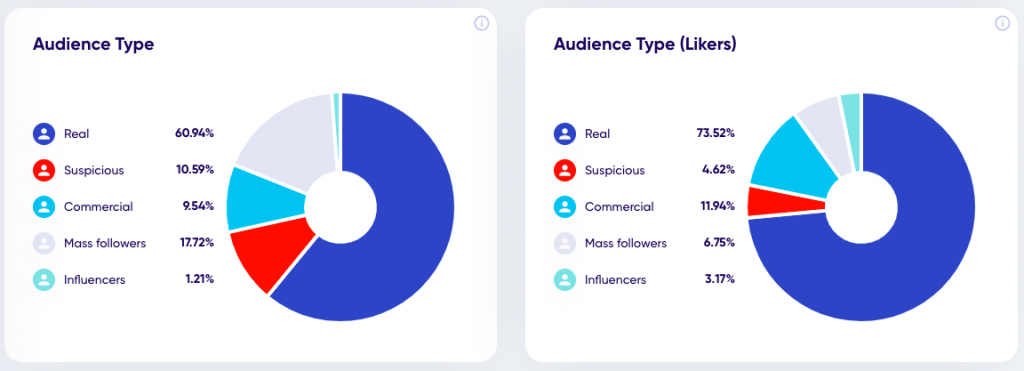
Another metric to pay attention to is growth in followers and followings. A large number of likes from users who don’t follow this account isn’t cool at all. It might mean that the account owner likes to get people to like their posts using inauthentic methods.
Also, watch out for a steep increase in the number of followers: this usually signifies a certain number of followers were bought recently.
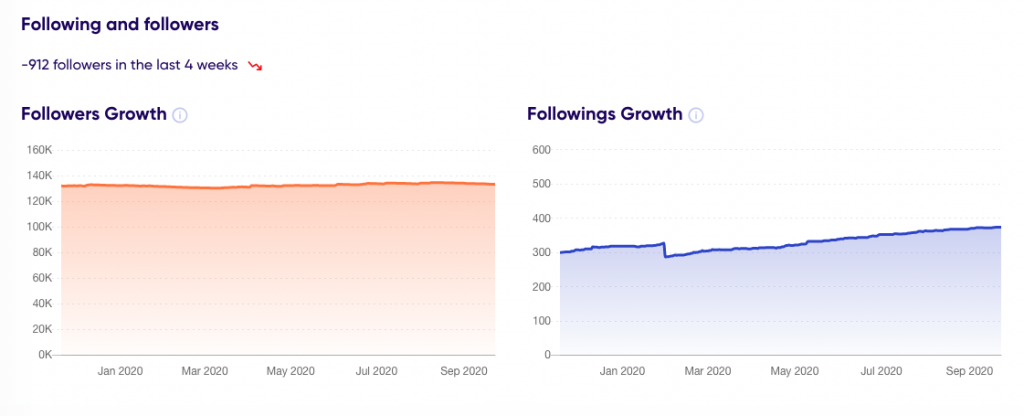
Have a look at the Posts frequency and percentage of likes from followers chart to see the posts to likes ratio. If the general percentage of likes is high, you can probably trust this blogger.
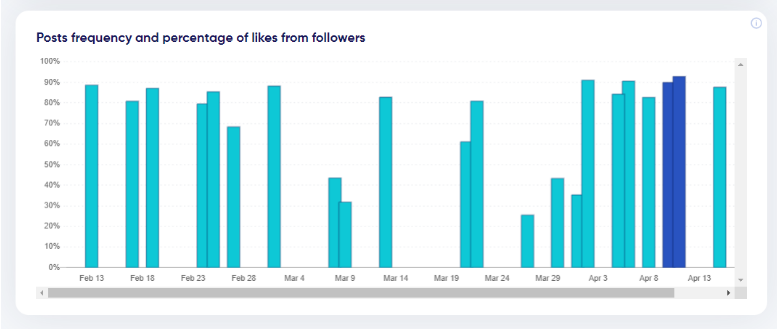
All metrics regarding comments are no less important. With trendHero, you get the opportunity to check the quality of comments. If the percentage of suspicious comments is higher than 5%, it might mean the presence of fake accounts. A large number of short comments might strike you as suspicious too. However, it’s important to understand that short comments aren’t always a bad sign. Sometimes real people just like to react to content with emojis.

Sometimes Instagrammers either pay people to like and comment or ask others to like and comment in exchange for the same in return. Needless to say, it has little in common with the authentic activity you are looking for. Using trendHero, you can track any inauthentic activity of this type. If there is a high percentage of comments from users with over 2000 followers, it should raise some flags.
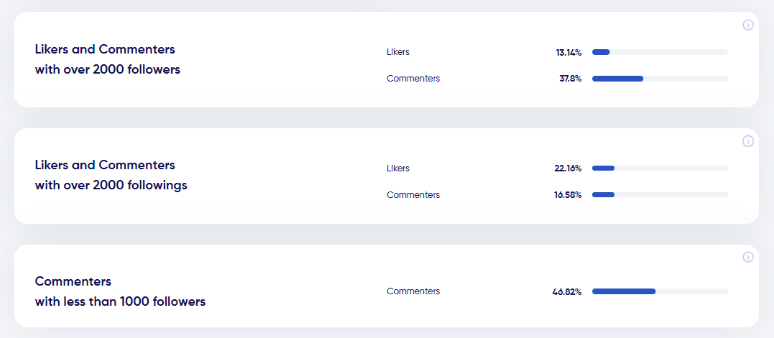
And last but not least, the metric that’s called Likes Spread. Right now, you don’t always have a chance to see the number of likes under each post. trendHero can help you with that. When the number of likes under each post is the same, it hints at the fake activity. If the gap between the number of likes under various posts is too big, it says the same. The percentage of likes spread you are looking for should be anywhere between 40% and 100%.
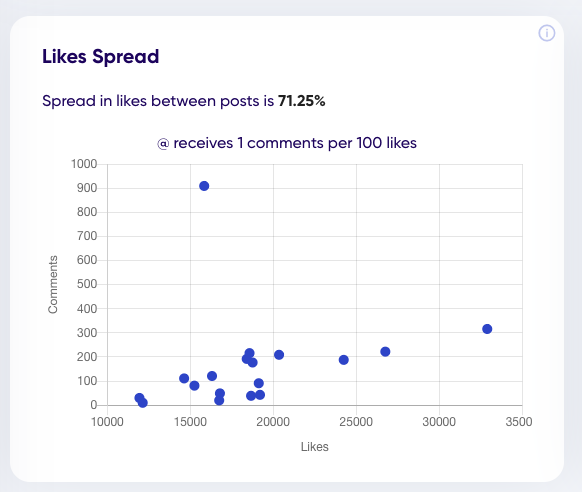
[Video] How to analyze Instagram influencers and check for fake followers in trendHERO
Time to see what is a real influencer marketer workflow for influencers analysis.
There are a lot of articles about what we look at and what we need to check performing account audit. Now let’s explore a real report to see how theory meets practice:
Looking for a tool to for Instagram account analysis?
Manually: Check out their followers and engagement
Automated services are great, but you don’t necessarily have to take their word for it. It never hurts to err on the conservative side and run a manual check. Yes, it might be much more time consuming but it’s absolutely free of charge.
1. Look at the quality of their followers
This is easy. As I already mentioned earlier, you can just go to their profile, find the Following tab, and look at the list of all profiles that follow this influencer. Pay special attention to the quality of these profiles. How many of them look like real people? How many of them have actual photos as user pics? How many commercial accounts? Are there many profiles in foreign languages? If the answer to all of these questions is “many”, the profile you are checking is festering with fakes.
Whenever you check a profile for the quality of its followers, there are a few things that must raise flags:
- Accounts with no profile photos;
- Accounts with random numbers and symbols in their user names;
- Foreign accounts (especially Middle Eastern or Indian).
2. Who is liking the posts?
There are a few criteria to evaluate the likes.
- Compare the number of likes to the number of subscribers.
With quite an authentic audience, likes will make up from 3,5% to 15% of the total number of followers. If an influencer has an audience of 100, 000 and only gets 1000 likes, it might be problematic. More often than not this kind of ratios betray a large number of fake followers.
Interestingly enough, the opposite ratios say pretty much the same.
If likes make up more than 15% of the total number of subs, and especially if the percentage is much higher than that, you should be on your guard. Unfortunately, Instagrammers often purchase likes from bots to show their potential sponsors some nice stats. If you are not quite sure whether the likes are real or not, open a few posts and look at the likes. If there are many bots, empty accounts, and commercial accounts, you are looking at fakes. - Take some time to view the old posts in the profile you are checking.
Have a look at the content that was posted half a year ago, a year ago, two years, if the account goes that far back. Study the likes dynamics. If back then they consistently had a hundred likes on each post but then the number of likes abruptly spiked to 2000, it means that’s when they started resorting to inauthentic activity. - Check if the number of likes plummeted at some point during the history of this account.
Say, one or two of the posts have a number of likes that’s significantly lower than usual. It’s most likely that the low number is the actual number of likes they are getting. All that’s higher than that was generated by fakes.
3. Check the comments and people who are leaving them
If you are looking at a profile with thousands of subscribers, there is no way they get just a few comments. No influencer that generates decent quality content (and that’s what you need as a marketer) goes without commenters.
Writing a comment is generally a more time- and effort-consuming action than just liking. So if comments make up at least 0,1% of the total number of followers, it’s ok. If the number of comments is lower than that, it can only mean one thing. This influencer bought some sock puppets but completely forgot about buying some comments. Or maybe they just decided not to waste their money (comments are usually more expensive than likes).
Now take a closer look. Every time you click on a photo, you can see the comment section on the right and see what they say. Take some time to read them. Do the comments match the topic of the post/the photo? Who wrote them? Are these comments actual meaningful phrases?
If all you see are one-word comments or comments that don’t really mean anything, like “I’m following you now” or “Hi!” or “Nice profile”, or just emojis, it’s the bots you are looking at.
Tools: Use an engagement calculator
For quite some time, brands determined how effective their partnerships with influencers would be by looking at the number of followers. This was the main indicator of the profile’s success and potential. The more subscribers there were the better. But at a certain point, someone asked a question that had to be asked: “Why exactly is a huge audience a good thing?”
In the current social media environment, Instagram profile owners get increasingly more conscious about how active their audience is and not about how many subscribers they’ve got. Every follower must be useful both to influencers and their potential sponsors. And being useful means showing interest and paying attention. To put it simply, being useful is being engaged.
There is a specific metric for that called an Engagement Rate (ER). Basically, the engagement rate is the combination of all targeted actions of users (likes, comments, views) per post, per user, or during a certain period of time. And this engagement rate is now the most important metric that helps brands evaluate the potential of their sponsorships.
Instagram Engagement Rate Calculator
There are formulas to calculate the engagement rate of followers. But you don’t necessarily have to plunge into the depths of mathematic calculations. Thankfully, there are services that can make your life so much easier by offering engagement calculators.
The trendHERO service has this kind of calculator built in their report on every profile you check. It automatically shows the rate and explains how it was calculated.
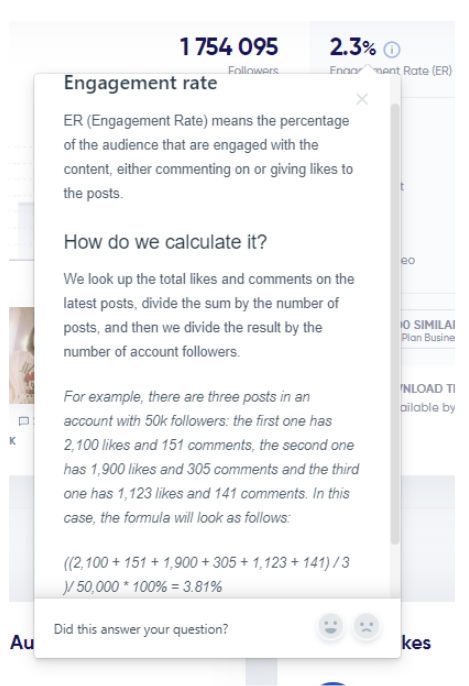
Conclusion
Because too many people want to be influencers and not too many understand what it entails, there is a huge number of bloggers but not so many honest ones. If you really want to find a quality profile to promote your product, you’ll have to do a full-on investigation and pay attention to every little thing.
Influencers can offer something that other advertising mediums can’t. They aim right at the very heart of your target audience. And this audience is prepared to love your product and remain loyal. They trust the opinion of the person who recommends products to them.
Unfortunately, unscrupulous bloggers put the breaks on the sheer potential of influencer marketing. Unless you want to pay for nothing but pretty stats, pay some effort to thoroughly check every profile that interests you for fake followers.
We also recommend to read
 A Marketer’s Guide To Influencer Discount Codes
A Marketer’s Guide To Influencer Discount Codes 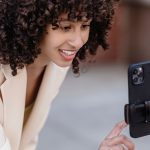 How To Make A Reel On Instagram (Plus Tips For Making Amazing Reels)
How To Make A Reel On Instagram (Plus Tips For Making Amazing Reels)  How To Add Music To An Instagram Story: Easy Guide
How To Add Music To An Instagram Story: Easy Guide  Complete Guide On How To Plan A Social Media Campaign
Complete Guide On How To Plan A Social Media Campaign  Guide To Brand Awareness & How To Build It
Guide To Brand Awareness & How To Build ItInstagram Engagement Rate Calculator For Free
Check any influencer's Engagement rate and analyze his or her followers growth history
Other free tools: Follower Count History, Instagram Follower Count, CPM Calculator
